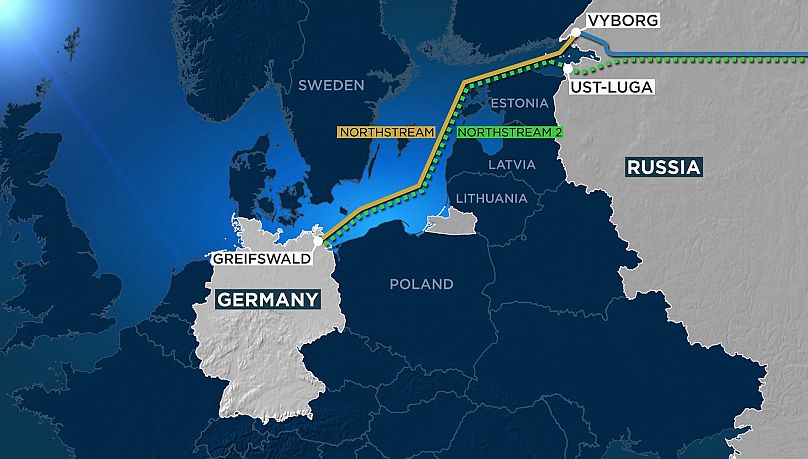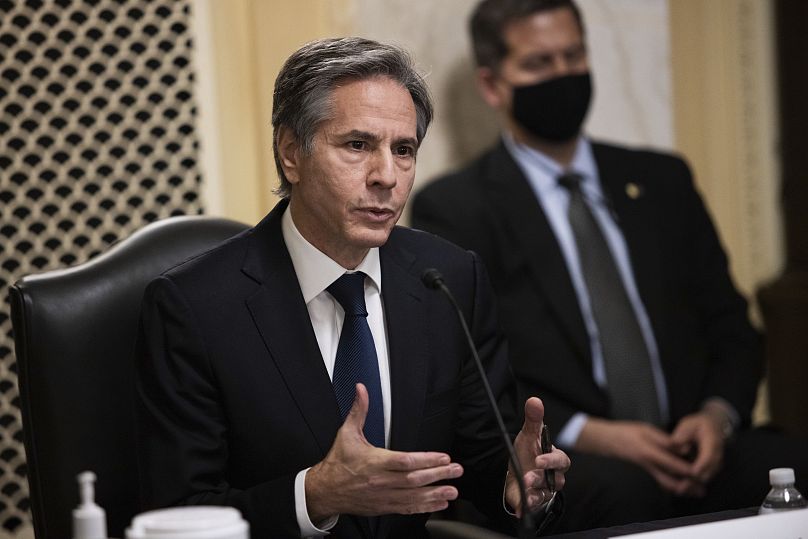MEPs and the US want Germany to halt the gas pipeline project linking Russia to Europe, following the poisoning and imprisonment of opposition figure Alexei Navalny.
The controversial Nord Stream 2 pipeline is once again the target of criticism by policy-makers, both in and outside the European Union.
Following the poisoning and imprisonment of opposition figurehead Alexei Navalny, Members of the European Parliament voted overwhelmingly in favour of a non-binding resolution calling for an immediate halt on the infrastructure project, which is 95% completed.
During a parliamentary debate last week centred on the arrest of Navalny, MEPs from across the political spectrum didn't mince words when describing their opposition to the pipeline.
Kati Piri, a Dutch MEP from the S&D group, said that “anyone who still believes that we should continue with Nord Stream 2 is blind to what kind of regime we are dealing with in Moscow.” Sergey Lagodinsky, a German MEP from the Greens group, argued the project “undermines democracy and solidarity” with Russian, Ukrainian and Polish society. And Urmas Peat, an Estonian representative of the liberal group Renew Europe, urged the EU to be united in its approach to Russia, including in its energy policy.
The resolution of the European Parliament, passed with 581 votes in favour and just 50 against, contains high praise of Alexei Navalny and strong condemnation of the government of President Vladimir Putin. By unambiguously demanding a halt to the Nord Stream 2 route, MEPs take aim at one of Russia's most valuable assets: its profitable gas exports.
Markus Pieper, a German MEP from the EPP, is among the minority supporting the pipeline. Pieper thinks that if Germany wants to phase out nuclear power and coal at the same time, natural gas will be needed as a bridge into the hydrogen age.
"Seen in this way, the end of Nord Stream is the beginning of American liquefied gas. It's a lot more expensive and polluting, but it's business for the U.S," Pieper told Euronews. "So for the U.S., whether Trump or Biden, Nord Stream is not about security interests, it is about their own business with fracking - at the expense of the environment."
A geopolitical dilemma
The Nord Stream 2 project is an undersea gas pipeline being built by Russia’s energy firm Gazprom and backed by five European energy companies. The 1,225 km conduit will run under the Baltic Sea, connecting Russia with the German coast near Greifswald. It will work in parallel with the first Nord Stream, which has been operational for years. Combined, the two pipelines are expected to increase the capacity to a total 110 billion cubic metres of gas a year.
Criticism has been mounting on the project over the last decade and has markedly increased in recent years as its conclusion nears. Opponents argue that Nord Stream 2 poses a security risk and will make Europe even more reliant on Russian fossil fuels (Russia is already the EU's main natural gas supplier), just as the bloc is transitioning towards renewable sources.
Furthermore, the pipeline has acquired a geopolitical dimension, with observers warning that its completion would hand Putin an easy tool to extend and entrench his influence across the continent. The project has been criticised by several European countries, such as Poland, always sceptical of any Russian manoeuvre, and Ukraine, who fears its own gas transmission system could be rendered redundant.
For Germany, the pipeline has become a diplomatic headache. German companies have invested heavily in Nord Stream 2, whose cost is estimated around 10 billion euros. A permanent halt that turns years of construction into a futile effort could entail disastrous consequences for all the business partners.
And yet, Germany, alongside the EU, continues to impose sanctions on Russian individual and entities – which are periodically renewed – and issues statements denouncing Putin's regime on a wide range of issues, like the invasion of Crimea, misinformation campaigns and chemical poisonings. German Chancellor Angela Merkel herself has been targeted by Russian hackers.
'A purely commercial project'
Despite national and international pressure to pause construction or cancel the pipeline altogether, Germany has remained unapologetically supportive of Nord Stream 2, arguing that it is simply a commercial project that has nothing to do with foreign policy or human rights.
"The Germans are in a strange state that neither the Europeans nor the Americans understand. They claim that this is purely a commercial project and that it's Germany's right to conduct such a project. It bypasses European law, because they effectively found a loophole under which to construct it and they want to go ahead with it," Gustav Gressel, senior policy fellow at the European Council on Foreign Relations, tells Euronews.
MEPs are not the only ones insisting that Germany change its mind before it is too late. Last year, the US Congress approved a sanctions mechanism that allows the US government to target any company involved in the project. The measure passed with bipartisan support.
During the confirmation hearing of Antony Blinken, Joe Biden's choice for Secretary of State, Senator Ted Cruz of Texas, one of the promoters of the sanctions, asked Blinken if the Biden Administration would hold the line and prevent Nord Stream 2 from being completed.
Blinken replied that President Biden thinks the pipeline is a "bad idea" and might consider using the new sanctions mechanism. "I know that he [Biden] would have us use every persuasive tool that we have to convince our friends and partners, including Germany, not to move forward with it," Blinken declared.
President Biden is keen on undoing the legacy of his predecessor and intends to bring allies on board to tackle international issues posed by China, Russia, Iran and others. Shortly after taking office, Biden signed a declaration to have the US rejoin the Paris Climate Accord and rescinded the construction permit for Keystone XL, a pipeline to carry oil crude from Alberta, Canada, to the American Gulf Coast.
Experts, however, caution that the project is too big to fail and that neither sanctions nor parliamentary resolutions might be enough to outsmart money interests.
"Any delay at the moment of Nord Stream is not that important. Nord Stream may well suffer delays if you sanction it today, but it will be done anyway and the consequences will not be that severe, especially with Covid where we have seen a reduction of the demand for gas," Jean-Arnold Vinois, Adviser on European Energy Policy at the Jacques Delors Institute, tells Euronews.
"And then, of course, if there is a reduction for the demand of gas, we have quite enough infrastructure to bring the necessary gas to the European Union."













